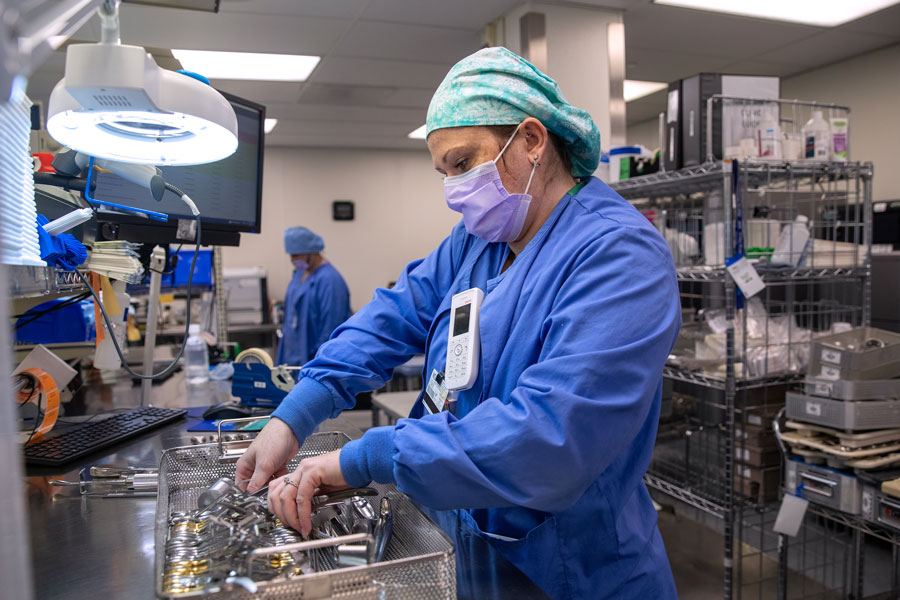Operation OR: Penn State Health surgical team works together for every patient's future
The surgical team at Penn State Health Milton S. Hershey Medical Center is like a pit crew, says one of its members, not because they race to complete their tasks but because they precisely manage their duties in a collaborative and often exciting environment.
Operating room nurse Tammi Schwartz uses the NASCAR pit crew comparison to describe how team members, including surgeons, anesthesiologists, nurses, technologists, aides and schedulers, work seamlessly together to provide the best results for patients.
“I’ve seen people admitted with awful trauma,” says Jill Enck, a certified surgical technologist who has served with Penn State Health for 28 years, “very seriously injured individuals who many people would not expect to survive but who later walk out of here” as a result of the excellent care they received.
“Incredible things happen here,” she says.

Celebrating second chance at life
Schwartz, a 12-year Penn State Health employee who is working on her bachelor’s degree in nursing, agrees. “For someone receiving a heart transplant,” she says, “we are essentially helping them to celebrate a second ‘birthday’.”
She serves as patient advocate in the OR. “I look out for the safety of the patient during the operation,” Schwartz explains, tracking supplies so all are accounted for following surgical wound closure, making certain no pressure injuries occur and keeping the patient comfortable at all times. “I love what I do,” she says.
The Milton S. Hershey Medical Center and Penn State Health Golisano Children’s Hospital provide the region’s only level 1 trauma center for both adults and children, which means surgical schedules are full, Enck says. Her position involves keeping the operating area sterile, passing surgical instruments to the surgeon and assistant and helping to retract tissue during the procedure. “Whether you’re working days or nights, you’re going to be busy. Each patient’s situation is unique, making the work interesting and exciting.”
Dedicated to the mission
Sabrina Sechrist, Sterile Processing Department manager, oversees preparations for surgery to make sure everything required, including instruments and “soft goods” such as sponges, is ready. That step can take place the evening before the next day’s surgeries but also throughout the day when there are trauma cases.
A certified registered central service technician, Sechrist has served with Penn State Health for more than 20 years. “I’m here for the long haul,” she chuckles. “I went through school while I was working here and decided to stay,” partly because of the positive atmosphere and collegiality. “A lot of the people you work with are friends and family, not just coworkers. This is a really great place to work.”
In fact, her faith in Penn State Health, which she characterizes as “our impact on lives,” has led family members to choose Hershey Medical Center for their health care needs.
An award-winning environment
Enck and Schwartz agree the medical center’s environment is healthy and rewarding. “Everyone is just fantastic here,” says Enck. “Staff members look out for each other. I often hear them asking, ‘Can I help?’ In fact, some of my closest friends are from work.”
Hershey Medical Center’s commitment to patient safety, patient-centered care, improving patient outcomes and overall operational excellence is reflected in its fourth-consecutive Magnet designation from the American Nurses Credentialing Center. Magnet status is the highest national recognition awarded to a hospital or medical center for excellence in nursing. Fewer than 10% of U.S. hospitals have achieved it, and just 116 hospitals in the U.S. have earned the Magnet designation four times in a row.
That focus leads to better patient relationships, Enck notes, as well as especially meaningful times. “You may have had babies here for treatment at very early ages and then see them four or five years later when they return for follow-ups or another procedure. You’re watching them grow as a result of the care they received,” she says. “That’s very rewarding.”
Skilled hands wanted
With 36 operating rooms, Hershey Medical Center and the Children’s Hospital are seeking skilled and trained surgical technologists to join their team.
Learn more about Penn State Health’s rewarding career opportunities in Surgical Services


